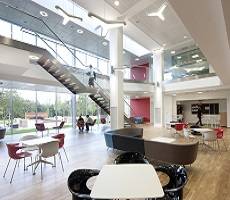October 2, 2013
Refurbished office named ‘best of the best workplace’ in BCO awards
 A refurbished building which houses the manufacturer of the hi-tec GoreTex fabric range has been named the best of the best workplace in the British Council of Offices (BCO) annual awards. W. L. Gore’s Edinburgh headquarters was recognised for its transformation from a building which was no longer fit for purpose to a modern, green and inspirational workplace. National winners in the BCO 2013 awards include the Crystal in London for innovation; Birmingham City Council offices for fit out of workplace; Cannon Place in London for refurbished workplace; and Astellas in Chertsey and Nestle Product Technology Centre in York for projects up to 2,000m²
A refurbished building which houses the manufacturer of the hi-tec GoreTex fabric range has been named the best of the best workplace in the British Council of Offices (BCO) annual awards. W. L. Gore’s Edinburgh headquarters was recognised for its transformation from a building which was no longer fit for purpose to a modern, green and inspirational workplace. National winners in the BCO 2013 awards include the Crystal in London for innovation; Birmingham City Council offices for fit out of workplace; Cannon Place in London for refurbished workplace; and Astellas in Chertsey and Nestle Product Technology Centre in York for projects up to 2,000m²




















September 20, 2013
The rehabilitation of the cubicle and other lessons from 100% Design
by Mark Eltringham • Comment, Events, Flexible working, Furniture, Products, Workplace design
UniteSE from KI
As we’ve said before, acoustics has become the dominant theme at office design exhibitions over the past three or four years. That’s been true at shows in Milan, Cologne, Chicago and London and was certainly the case at this year’s 100% Design at Earl’s Court. A quick whizz around the office zone at this year’s event – which is a useful way of getting an impression before you stop to talk to people about the detail of what they’re doing – revealed that well over half of the exhibitors were showcasing products that addressed the issue of acoustics. And yet things have also moved on from recent events, not least in the rehabilitation of that most demonised of all office furniture pieces – the cubicle.
(more…)